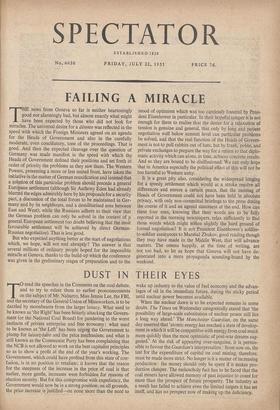FAILING A MIRACLE
THE news from Geneva so far is neither hearteningly good nor alarmingly bad, but almost exactly what might have been expected by those who did not look for miracles. The universal desire for a détente was reflected in the speed with which the Foreign Ministers agreed on an agenda for the Heads of Government and also in the carefully moderate, even conciliatory, tone of the proceedings. That is good. And then the expected cleavage over the question of Germany was made manifest in the speed with which the Heads of Government defined their positions and set forth in order of priority the problems as they saw them. The Western Powers, presenting a more or less united front, have taken the initiative in the matter of German reunification and insisted that a solution of this particular problem should precede a general European settlement (although Sir Anthony Eden had already blurred the edges admirably here by his proposals for a security pact, a discussion of the total forces to be maintained in Ger- many and by its neighbours, and a demilitarised area between East and West); while the Russians adhere to their view that the German problem can only be solved in the context of a general European settlement (no doubt believing that the most favourable settlement will be achieved by direct German- Russian negotiation). That is less good.
But who expected anything better at the start of negotiations which, we hope, will not end abruptly? The answer is that several millions of ordinary people hoped for the impossible miracle at Geneva, thanks to the build-up which the conference was given in the preliminary stages of preparation and to the mood of optimism which was too carelessly fostered by Presi- dent Eisenhower in particular. In their hopeful temper it is not enough for them to realise that the desire for a relaxation of tension is genuine and general, that only by long and patient negotiation well below summit level can particular problems be solved, and that the real function of the Heads of Govern- ment is not to pull rabbits out of hats, but by frank, polite, and private exchanges to prepare the way for a return to that diplo- matic activity which can alone, in time, achieve concrete results. And so they are bound to be disillusioned. We can only hope that in America especially the political effect of this will not be too harmful to Western unity.
It is a great pity also, considering the widespread longing for a speedy settlement which would at a stroke resolve all differences and ensure a certain peace, that the meeting of Heads of Government could not have been held in absolute privacy, with only non-committal, briefings to the press during the course of it and an agreed statement at the end. How can these four men, knowing that their words are to be fully reported in the morning newspapers, relax sufficiently to find those words which might soften slightly the hard ground of formal negotiation2 It is not President Eisenhower's soldier- to-soldier assurances to Marshal Zhukov, good reading though they may have made in the Middle West, that will advance matters. The omens happily, at the time of writing, are not too bad, so let us hope that Geneva will not have de- generated into a mere propaganda sounding-board by the weekend.


















































 Previous page
Previous page